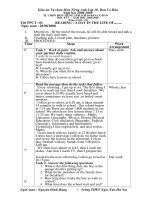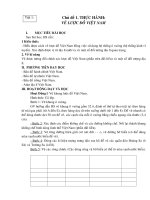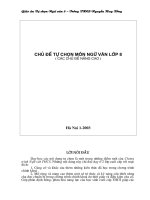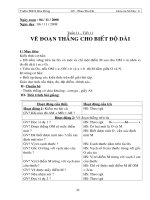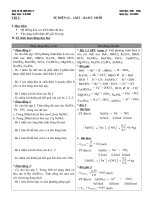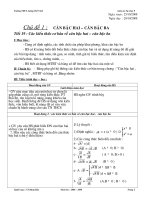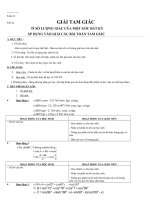Giáo án tự chọn - Revise the tenses of English
Bạn đang xem bản rút gọn của tài liệu. Xem và tải ngay bản đầy đủ của tài liệu tại đây (124.93 KB, 3 trang )
<span class='text_page_counter'>(1)</span>Tu chon 13 Date 11/03/ 2011 Revise the tenses of English I. Objectives: - Revise Ss some tenses of English : Past simple, past continuous, past perfect tense - Helps Ss to practice do exercises related to tense of English. II. Materials: - Handout, guide book. III. Anticipated problems: Ss may confuse with skill tasks, so T should ready to assist them. IV. Procedure: ti Procedure Interaction me 15’ 1.Presentation Whole class - Review the form and use of past simple, past continuous, and past perfect tense. - Call on some Ss to retell the form and use of each tense and give an example. - Comment and give final summary. I. The past simple tense a. FORM - Normal verb: + Affirmative: S+ Ved + Negative: S+did + not +V… +Interrogative: Did+ S + V….? - To Be: + Affirmative: S + was/ were… + Negative: S+ was/ were + NOT... + Interrogative: Was/ were + S +…? b. USES: - Diễn tả một hành động xảy ra và kết thúc trong quá khứ - Kể lại một loạt hành động đã xảy ra trong quá khứ. DẤU HIỆU NHẬN BIẾT: - Thường đi với các trạng từ chỉ mức độ thường xuyên như: always, usually, sometimes, often, every / day /week ..., seldom, rarely, frequently, occasionally… - Một sổ trạng từ khác: time + ago, last + time, yesterday, in + a year.... - Note: : Với những động từ thường có kết thúc là ( o,sh , s , ch, x, z) khi chia ở ngôi thứ ba số ít ( he , she , it , N ) ta thêm "-es" vào sau động từ đó. Ex: She teaches English. II. The Past continuous tense a. Form: (+) S + was / were + V-ing (-) S + was / were + not + V-ing (?) Was / Were + S + V-ing? WH + Was / Were + S + V-ing? b. Uses: - Diễn tả một hành động đang xảy ra tại một thời điểm xác định trong qu¸ khø. Ex:At 8 p.m last night I was doing my homework. - Diễn tả một hành động đang xảy ra trong quá khứ (dùng quá khứ tiếp diễn)thì bị một hành động khác cắt ngang (sử dụng quá khứ đơn). Hai hành động này nối với nhau bằng từ "when or while" có thể đứng đầu c©u hoÆc gi÷a c©u.. Lop11.com.
<span class='text_page_counter'>(2)</span> Ex: I was watching TV when my father came home. - Diễn tả hai hành động tiếp diễn song song xảy ra cùng một lúc trong quá khứ. (thường dùng với while và while thường đứng giữa câu) Ex: We were playing football while he was playing badminton. III. The past perfect tense a. Form: (+) S+ had + V-ed/ Vc3 + O (-) S+ hadn’t + V-ed/ Vc3 + O (?) Had + S + V-ed/ Vc3 + O? WH + had + S + V-ed/ Vc3 + O? b. Uses: - Diễn tả một hành động hoàn thành trước một hành động khác trong qu¸ khø. Ex: - After Nam had done his homework, he went to bed. - They had lived in Dong Thap before they moved to HCM city - Diễn tả hành động hoàn thành trước một thời gian nào đó trong quá khø. Ex: He had lived in Hanoi before 1990. 28’ 2. Practice: - Ask Ss to put the verbs in brackets into the past simple or past continuous tense. ( give handouts). - Ask Ss compare their answers with a partner. * Exercises: Exercise 1: Put the verb in brackets into the simple past, past continuous or past perfect tense. 1. I...(get) up at 7.00 o’clock. The sun ..(shine), so I ..(go) for a walk. 2. Nancy ...............(not/ go) to work yesterday. She was ill. 3. Mai.................( watch) television when I .............(phone) her. 4. I (see)...........Barbara at the party. She ............(wear) a red dress. 5. When we...............(go) out , it................................(rain). 6. The postman...............(come) when I ................(have) breakfast 7. The boy.........(break) a window when they ..........(play) football. 8. I ...................(have) a bath when the phone..........................(ring). 9. What ..............(you/ do) on Saturday evening? – I went dancing. 10. When w……..(arrive) at the bus stop, the bus ….(already/ start). 11. I ………(worry) a lot before I heard from my beloved aunt. 12. We……..(drink) a small cup of tea after we...(finish) breakfast. 13. Tom ………..(just/ go) out when I …….(call) at his home. 14. The hostess ….……be sure that sh………..(see) the thief before. 15. When I …(reach) the station, the train ………(already/leave). 16. As soon as the children ...(finish) their breakfast , they …….(run) out to play. 17. The sun ……..(set) before I……..…… (be)ready to go. 18. He …….(learn) a lot of English before he ….(go ) to England. 19. He …….(thank) me for what I ……….(do) for his parents. 20. When we ……….(come) many guests …….(arrive). - Call on some Ss to go to the board and write the answers. - Ask other Ss to comment and give correct answers. ( T should correct some sentences or difficult sentences and ask Ss do the rest at home) W - Summarize the main point of the lesson ra - Ask Ss to do some more extra exercises in the workbook. pup 2’. Lop11.com. Individual and pair work Whole class. Whole class.
<span class='text_page_counter'>(3)</span> Lop11.com.
<span class='text_page_counter'>(4)</span>
